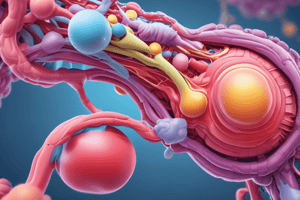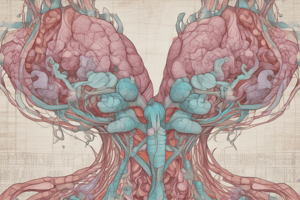Podcast
Questions and Answers
What is the primary mechanism of action for T4 and T3 when they enter the cell?
What is the primary mechanism of action for T4 and T3 when they enter the cell?
- They dissociate from thyroglobulin proteins and enter the nucleus. (correct)
- They stimulate hormone release from the pituitary gland.
- They alter membrane permeability of the cell.
- They bind to mitochondrial receptors.
Which form of T3 receptor has a high abundance in the liver, kidney, and heart?
Which form of T3 receptor has a high abundance in the liver, kidney, and heart?
- Alpha T3 receptor (correct)
- Gamma T3 receptor
- Beta T3 receptor (correct)
- Delta T3 receptor
What physiological response occurs upon the activation of T3 receptors?
What physiological response occurs upon the activation of T3 receptors?
- Formation of lipids
- Increased RNA formation and protein synthesis (correct)
- Inhibition of DNA replication
- Reduction of cellular respiration
Which of the following statements about T4 and T3's affinity for nuclear receptors is true?
Which of the following statements about T4 and T3's affinity for nuclear receptors is true?
Where are T3 receptors predominantly found?
Where are T3 receptors predominantly found?
What is the process called when T4 is converted to T3?
What is the process called when T4 is converted to T3?
What respiratory symptom is associated with hypoproteinemia?
What respiratory symptom is associated with hypoproteinemia?
Which cardiovascular effect is linked to increased PVR in hypoproteinemia?
Which cardiovascular effect is linked to increased PVR in hypoproteinemia?
What eye condition can result from hypoproteinemia?
What eye condition can result from hypoproteinemia?
Which symptom indicates decreased cardiac output in the context of hypoproteinemia?
Which symptom indicates decreased cardiac output in the context of hypoproteinemia?
Which of the following is a respiratory consequence of hypoproteinemia?
Which of the following is a respiratory consequence of hypoproteinemia?
What cardiac condition is noted with decreased PVR in hypoproteinemia?
What cardiac condition is noted with decreased PVR in hypoproteinemia?
Which of these symptoms is associated with hypoproteinemia and observed around the eyes?
Which of these symptoms is associated with hypoproteinemia and observed around the eyes?
Which cardiovascular symptom would you expect in a patient experiencing tachycardia due to hypoproteinemia?
Which cardiovascular symptom would you expect in a patient experiencing tachycardia due to hypoproteinemia?
What is the main reason to avoid radioiodine during pregnancy?
What is the main reason to avoid radioiodine during pregnancy?
What is the treatment regimen for neonatal Graves disease?
What is the treatment regimen for neonatal Graves disease?
What is the characteristic feature of non-toxic goiter?
What is the characteristic feature of non-toxic goiter?
What is the best management for non-toxic goiter caused by iodine deficiency?
What is the best management for non-toxic goiter caused by iodine deficiency?
What condition can lead to the development of neonatal Graves disease?
What condition can lead to the development of neonatal Graves disease?
What is the appropriate management for thyroid neoplasms?
What is the appropriate management for thyroid neoplasms?
What is the main onset of action time for the inhibition of hormone release via thyroglobulin proteolysis?
What is the main onset of action time for the inhibition of hormone release via thyroglobulin proteolysis?
Which of the following is a reason to use iodinated contrast media?
Which of the following is a reason to use iodinated contrast media?
What is a potential side effect of iodinated contrast media?
What is a potential side effect of iodinated contrast media?
Why should iodide not be used alone in treating thyrotoxicosis?
Why should iodide not be used alone in treating thyrotoxicosis?
What is a contraindication for using iodide during treatment?
What is a contraindication for using iodide during treatment?
What is the primary mechanism of action for radioactive iodine in treating thyrotoxicosis?
What is the primary mechanism of action for radioactive iodine in treating thyrotoxicosis?
What happens to the heart rate within 3 days after administering iodinated contrast media?
What happens to the heart rate within 3 days after administering iodinated contrast media?
What is the half-life of radioactive iodine (^131^I)?
What is the half-life of radioactive iodine (^131^I)?
What is the main concern when using radioactive treatment for hyperthyroidism in patients over 40 years old?
What is the main concern when using radioactive treatment for hyperthyroidism in patients over 40 years old?
Which beta blocker is widely recognized as the drug of choice for managing symptoms of thyrotoxicosis?
Which beta blocker is widely recognized as the drug of choice for managing symptoms of thyrotoxicosis?
What life-threatening condition is characterized by a sudden acute exacerbation of thyrotoxicosis symptoms?
What life-threatening condition is characterized by a sudden acute exacerbation of thyrotoxicosis symptoms?
Which treatment is NOT indicated for a thyroid storm?
Which treatment is NOT indicated for a thyroid storm?
During pregnancy, what is the recommended surgical treatment for thyrotoxicosis?
During pregnancy, what is the recommended surgical treatment for thyrotoxicosis?
What adjunct treatment should be used when patients are resistant to guanethidine and reserpine?
What adjunct treatment should be used when patients are resistant to guanethidine and reserpine?
What is the main action of saturated potassium iodide in the treatment of thyrotoxicosis?
What is the main action of saturated potassium iodide in the treatment of thyrotoxicosis?
Which drug is included in the treatment regimen for thyroid storm to protect against shock?
Which drug is included in the treatment regimen for thyroid storm to protect against shock?
Flashcards are hidden until you start studying
Study Notes
Mechanism of Action of Thyroid Hormones
- T4 and T3 dissociate from thyroglobulin proteins and enter cells by diffusion or active transport.
- T4 is converted to T3 within cells, with T3 binding to specific alpha and beta thyroid hormone receptors primarily in liver, kidney, heart, lungs, skeletal muscles, pituitary gland, and intestines.
- Activation of T3 receptors enhances RNA formation and protein synthesis, leading to physiological responses.
- T4 has about 10 times lower affinity for receptors than T3.
Thyroid Hormones Chemistry
- T4 (Thyroxine) transforms to T3 (Triiodothyronine) through deiodination.
- Reverse T3 is another inactive form of thyroid hormone.
- All forms of thyroid hormones are levo-isomers.
Clinical Manifestations in Hypothyroidism and Thyrotoxicosis
- Respiratory System: Hypothyroidism leads to dyspnea and decreased vital capacity; thyrotoxicosis can cause pleural effusion and hypoventilation.
- Cardiovascular System: Hypothyroidism results in decreased peripheral vascular resistance (PVR) and increased heart rate, stroke volume, and cardiac output; thyrotoxicosis exhibits increased PVR and bradycardia.
- Ocular Symptoms: Thyrotoxicosis can cause upper lid retraction and exophthalmos; hypothyroidism may present with drooping eyelids and periorbital edema.
Hormonal Release and Management
- Inhibition of hormone release results from suppression of thyroglobulin proteolysis.
- Thyroid hormone therapy onset is within 2-7 days.
- Must be combined with thioamides to prevent exacerbation of thyrotoxicosis.
- Contraindications include use alongside radioactive iodine and during pregnancy.
Adverse Effects of Thyroid Medications
- Uncommon effects include acneiform rash, swollen salivary glands, conjunctivitis, fever, metallic taste, bleeding disorders, and potential anaphylactoid reactions.
Iodinated Contrast Media
- Examples: Ipodate, Io-panoic acid, and diatrizoate.
- Inhibit conversion of T4 to T3, improving symptoms of thyrotoxicosis like heart rate normalization within 3 days.
- Serve as non-toxic adjuncts in thyroid storm treatment.
Radioactive Iodine Therapy
- ^131I is used for treating thyrotoxicosis, rapidly absorbed and concentrated in the thyroid gland.
- Its beta-ray emission induces thyroid cell necrosis and disruption; has a half-life of around 5 days.
- Contraindicated in patients over 40 years old due to risk of genetic damage and leukemia, not recommended in pregnancy or nursing.
Use of Beta Blockers
- Aid in managing symptoms of thyrotoxicosis mimicking sympathetic stimulation.
- Propranolol is the preferred choice for reducing symptoms associated with hyperthyroid conditions.
Thyroid Storm
- Represents a life-threatening exacerbation of thyrotoxicosis symptoms.
- Treatment includes IV Propranolol, Diltiazem, saturated potassium iodide, iodinated contrast agents, and corticosteroids to protect against shock and inhibit T4 to T3 conversion.
Management of Thyrotoxicosis in Pregnancy
- Surgical removal of part of the thyroid gland (subtotal thyroidectomy) is recommended during pregnancy.
- Use of PTC and thyroid supplementation post-surgery while avoiding radioiodine due to placental crossing.
Neonatal Graves' Disease
- May occur in newborns due to maternal antibodies or genetic transmission; typically self-limiting within 4-12 weeks.
- Treatment involves PTC, iodine supplementation, and propranolol, with gradual withdrawal as the infant improves.
Non-Toxic Goiter
- Characterized by thyroid enlargement without excessive hormone production, often due to iodine deficiency.
- Treatment typically involves iodine supplementation via iodized salt or thyroxine to suppress TSH stimulation and address hypothyroidism.
Thyroid Neoplasm
- Can be benign or malignant; biopsy is essential for diagnosis.
- Management often entails total thyroidectomy followed by radioiodine therapy and lifelong levothyroxine replacement.
Studying That Suits You
Use AI to generate personalized quizzes and flashcards to suit your learning preferences.




